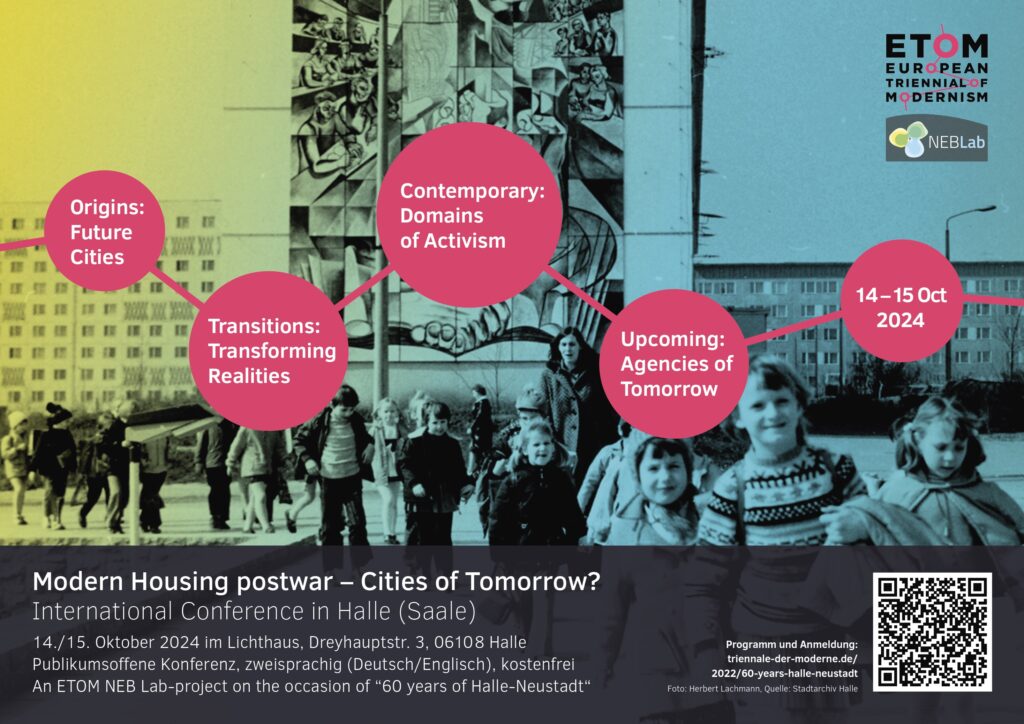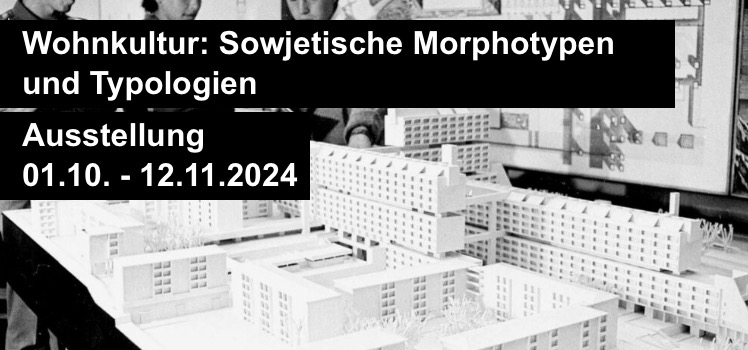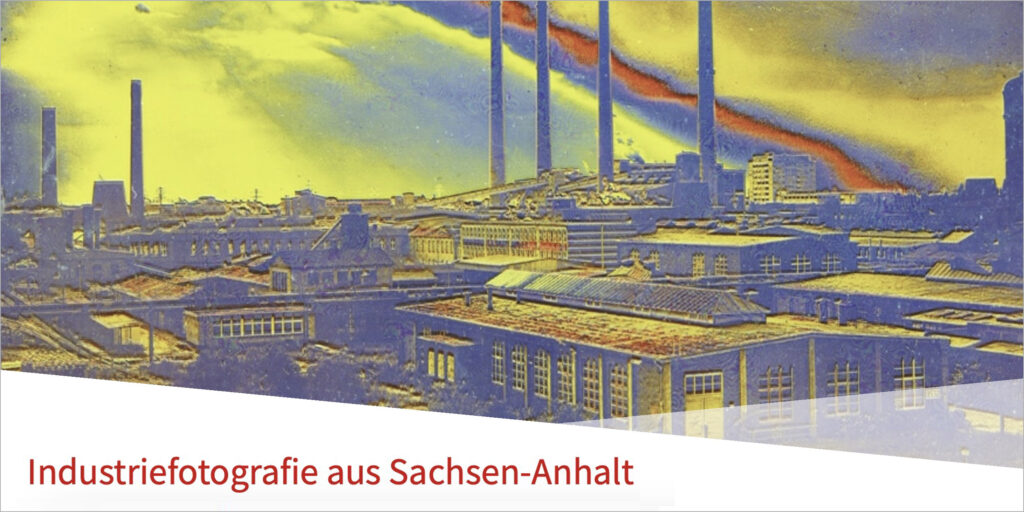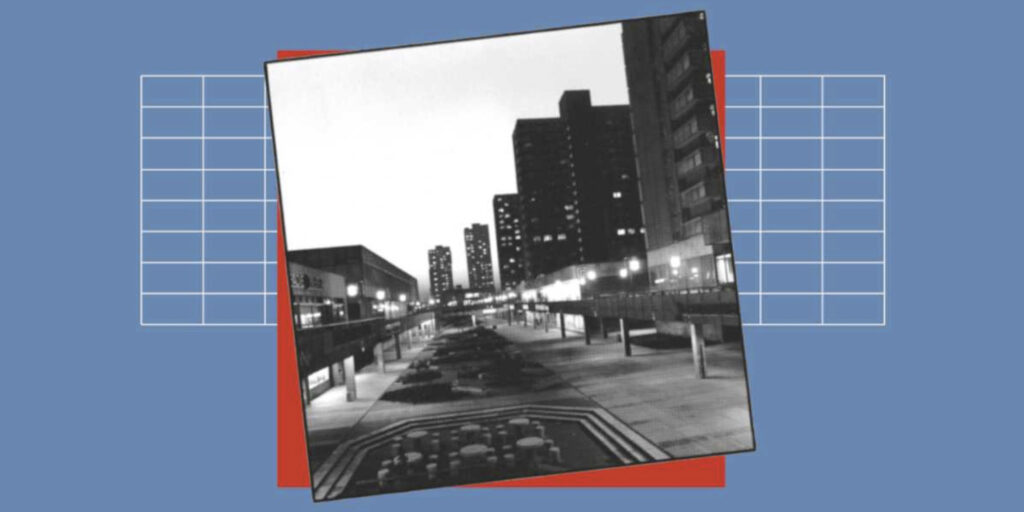14–15 Oct 2024
International Conference in Halle
Modern Housing postwar – Cities of Tomorrow?
Section 1 • Section 2 • Section 3 • Section 4 • Closing Panel
Preamble: Based on the underlying key questions and approaches, the conference is divided into four thematic sections. In these four sections, the questions are discussed in a result-oriented manner, involving impulse statements and reference examples, in the format of workshop talks with speakers and conference guests. The aim is to interconnect the three sectors which are also addressed and represented in the ETOM NEB Lab – professional actors, civil society and political institutions. The results of each thematic section will be wrapped up in a “lessons learned”.
- Section 1 – Origins | Future Cities – emerging futures
- Section 2 – Transitions | Transforming Realities – alterations of decline and renewal
- Section 3 – Contemporary | Domains of Activism – her/histories of activism
- Section 4 – Upcoming | Agencies of Tomorrow – local and planetary challenges
Section 1
Mon – Oct 14, 2024, 13:00
Origins | Future Cities – emerging futures
The title of this section refers to the “historical future designs” and “projected futures” that are related to the urban planning designs and large-scale housing concepts of post-WWII Modernism. The subject of the first section is the investigation of these origins, based on the qualities and weaknesses of these future concepts of the time and their implementation, with a view to understanding the causes and backgrounds on the one hand and from today’s perspective on the other.
The topic and examination make use of reference examples, particularly in a Central European comparison, with the urban planning, architectural, housing, transport, cultural and social concepts and implementations being considered as contextually as possible.
The focus of the workshop discussion is on the positive and negative characteristics that can be derived from this heritage of the built environment and the existing stock.
In this sense, the section’s “lessons learned” follows on from the question “What do we inherit from ‘historic futures’, positive/negative legacy?”, with the aim of identifying advantageous and disadvantageous aspects of the legacy, particularly in relation to the upcoming joint European future tasks and perspectives.
- Impulse-statements
- Helena Huber-Doudová, ETOM NEB Lab / National Gallery Prague
- Michał Wisniewski, ICC Krakow
- Svitlana Smolenska, div. universities (Ukraine / Germany)
- Verica Krstic, University of Belgrade
- Gergely Hartmann, MOME – Moholy-Nagy University of Art and Design Budapest / Project „ModernGyőr“
- Mykola Bevz, Lviv Polytechnic University
- had to cancel at short notice: Hana Řepková,
National Monument Institute, Prague - had to cancel at short notice: Thomas Flierl,
Architectural Historian, Max-Lingner Foundation, Berlin - Workshop-Talk / workshop discussions (incl. short break)
Moderators: Uta Pottgiesser, DOCMOMO International;
Helena Huber-Doudová, ETOM NEB Lab / National Gallery Prague - Lessons learned – Question:
What do we inherit from “historic futures”, positive/negative legacy?
Section 2
Mon – Oct 14, 2024, 15:30
Transitions | Transforming Realities – alterations of decline and renewal
Section two deals with the comprehensive changes, including the political, societal, and economic circumstances – structural changes – in the transition period after the fall of the so-called Iron Curtain as well as the concrete urban development changes and especially urban redevelopment programs of this period. By introducing reference examples, particularly in an Central European comparison the section focusses a holistic and analytical view of the reasons and critical aspects of why and how changes and (re)development programs have been elaborated and implemented.
The workshop talk will investigate the different paths, manifestations and results of the transformation, addressing the previous and current effects of past changes as well as the current changes and effects on subsequent and consequent future tasks. It will partly take place in breakout-rooms, allowing a multiple focus and „Learning about diverse realms and realities of transformation“.
Following up on this, the “lessons learned” of section two, under the question “What crucial abilities can we derive for sustainable transformations?”, aims to identify the essential conditions and constellations for a sustainable transformation – or for the opposite.
- Impulse-statements
- Hubert Trammer, ETOM NEB Lab / New European Bauhaus – High-Level Roundtable
- Peter Szalay, Slovak Academy of Sciences
- Lenka Burgerova, ETOM / Prague 7 – deputy mayor
- Tinatin Gurgenidze, Tbilisi Architecture Biennal
- Hanna Bondar, Member of the Ukrainian Parliament
- Regina Balla, Budapest University of Technology and Economics
- Guido Schwarzendahl, Cooperative Housing International / Bauverein Halle & Leuna
- Workshop-Talk / workshop discussions (incl. short break)
Moderators: Eszter Dávida, ETOM NEB Lab / KÉK – The Hungarian Contemporary Architecture Center / New European Bauhaus – High-Level Roundtable; János Klaniczay, ETOM NEB Lab / KÉK – The Hungarian Contemporary Architecture Center - Breakout-Rooms (plus audience):
Learning about diverse realms and realities of transformation - Lessons learned – Question:
What crucial abilities can we derive for sustainable transformations?
Section 3
Tue – Oct 15, 2024, 10:00
Contemporary | Domains of Activism – her/histories of activism
The title of section three refers to the respective contemporary or up-to-date approaches to activist engagement or its respective “her/histories”. The notion of activism incorporates activist approaches from the period before the fall of the so-called Iron Curtain, for example in terms of preservation and cautious or protective urban renewal, until previous or today’s forms of activist engagement that originate from the post-1989 transition. The section title “Contemporary” reflects on these notions, delving into the current approaches to activist engagement and each of their her/histories of these once contemporary “eras”. The focus is on civic society engagement in the transition period; while Halle-Neustadt in particular represents a significant example of activist-driven development and – now – her/history in this regard.
The impulse contributions and international examples again foster the Central European comparison.
The workshop talk deals with the different modes of action or areas – domains – of activism, the different approaches and agencies of its activists and representatives, and the often temporary limitations compared to the results achieved or the lasting influences of the commitment on the development of transformation.
In this sense, the “lessons learned” is based on the question “How or how long can temporary achievements maintain permanent?” and aim to discover how or to what extent activist approaches can make a sustainable and lasting contribution to a positive transformation development or the formal development planning.
- Impulse-statements
- Barbara Szij, KÉK – The Hungarian Contemporary Architecture Center
- Saimir Kristo, Universiteti Barleti, Tirana / Tirana Architecture Triennale
- Zofia Piotrowska, WSPÓŁ Association for Housing / RZUT Quarterly
- Alex Axinte, Studio Basar, Bucharest
- Polina Ljaševa, „Lasnaidee“ – community movement in Lasnamäe housing area
- Barbara Engel, KIT Karlsruhe
- Workshop-Talk / workshop discussions (incl. short break)
Moderators: Klára Prešnajderová, ETOM NEB Lab / Slovak Design Center; Kacper Kępiński, NIAiU – National Institute of Architecture and Urban Planning, Warsaw - Lessons learned – Question:
How or how long can temporary achievements maintain permanent?
Section 4
Tue – Oct 15, 2024, 13:30
Upcoming | Agencies of Tomorrow – local and planetary challenges
The topic of the last section deals with future prospects, based on current and future development and policy goals, including a comparison of local future concepts and urban development agendas across Central European cities, taking into account exemplary local and overarching, European and global framework conditions and objectives.
The workshop talk will take a deeper look to compare different constellations of existing and newly emerging challenges and opportunities. The discussion will be expanded to breakout-rooms, with the aim of “Exploring emergences of present chances and challenges”. The workshop discussion also aims to probe the importance of cooperation and forms of participation that are conducive or necessary for sustainable, positive development and responses to transformation tasks.
To this end, the “lessons learned” addresses the question of “How can we pursue/sustain (trans-sectoral) agencies for a better future?”. In other words, how can these beneficial and necessary forms of participation and in particular transsectoral cooperation be sustainably expanded and maintained?
- Impulse-statements
- Ruta Leitanaite, ETOM NEB Lab / Architects‘ Council of Europe / UREHERIT program
- Monika Konrad, City of Warsaw, Department of Architecture and Spatial Planning – Deputy Director / Brno Technical University
- Zoltán Erő, City of Budapest – Chief Architect
- Yvette Vašourková, CCEA – Centre for Central European Architecture
- Bernd Hunger, Competence Center for Large Housing Estates
- Ulrich Möbius, Project „Stasi Areal Halle“, Peissnitzhaus
- Workshop-Talk / workshop discussions (incl. short break)
Moderators: Ruta Leitanaite, ETOM NEB Lab / Architects‘ Council of Europe / Architects Association of Lithuania; Robert K. Huber, ETOM NEB Lab / BHROX bauhaus reuse / zukunftsgeraeusche - Breakout-Rooms (plus audience):
Exploring emergences of present chances and challenges - Lessons learned – Question:
How can we pursue/sustain (trans-sectoral) agencies for a better future?
Closing Panel
Tue – Oct 15, 2024, 18:30
Sketching big points of postwar modern housing for tomorrow
As the closing round of discussion, the “final lessons” initially serve to bring together the “lessons learned” from the four topic sections, as well as takeaways from the keynote lectures, and reflect and summarize on them in interrelation. Building on this, the objective of “Sketching big points of postwar modern housing for tomorrow” should ideally be to summarize overarching big points for recommendations, ideas for strategies, or measures that can have a significant positive influence on the future sustainable development of urban design and large-scale housing construction of post-1945 Modernism.
- Nataliia Mysak, ETOM NEB Lab / Spatial Practice Lab, Lviv
- Marlena Happach, Poland National Institute of Heritage
- plus further speakers of the conference
- had to cancel on short notice: Agata Twardoch,
Silesian University of Technology, Gliwice
14 + 15 Oct 2024
International Conference in Halle (Saale)
“MODERN HOUSING POSTWAR – CITIES OF TOMORROW?”

Program and Updates
https://triennale-der-moderne.de/2022/press-download-60-jahre-halle-neustadt/
Visuals and Images
triennale-der-moderne.de/2022/press-download-60-jahre-halle-neustadt/
Speakers and Panelists
biographies and CVs of all participants
Stay tuned via Social Media
Apart from the main festival season the website www.triennale-der-moderne.de is only updated occasionally. In the meanwhile, we keep you posted via our Social Media channels. If you want to help to spread the news, we will be happy to see your likes, shares and re-posts 🙂
- Event announced via Facebook
- Event announced via LinkedIn
as well as posts at - Facebook (#TriennaleDerModerne)
- Instagram (@triennale_der_moderne)
- Twitter (@TdModerne)
Cooperation partners / Supporters
- ETOM – European Triennial of Modernism
- ETOM NEB Lab –
represented by the Coordination Group:- BHROX bauhaus reuse / zukunftsgeraeusche
- KEK – Hungarian Contemporary Arch. Center
- ICOMOS international,
- NGP – National Gallery Prague
- SVK – Slovak Design Center
- EKA – Estonian Academy of Art,
- ACE – Architects’ Council of Europe
- buschfeld.com – graphic and interface design
- BMWSB – German Federal Ministry for Housing, Urban Development and Building
- State of Saxony-Anhalt – Ministry for Infrastructure and Digital Affairs and the State Chancellery and Ministry for Culture
- City of Halle (Saale)
- Foundation for Polish-German Cooperation
- Pilecki-Institute Berlin
- NIAiU – National Institute of Architecture and Urban Planning, Warsaw
- ICC – International Culture Center, Krakow
- SALEG – Landesentwicklungsgesellschaft
- Kompetenzzentrum Stadtumbau
- Zukunftszentrum für Deutsche Einheit und Europäische Transformation
- New European Bauhaus (NEB) at the European Commission
- ICOMOS international / Deutschland
- DOCOMOMO international
Curation and Organization
- Robert, K. Huber (1st curator)
- ETOM NEB Lab (co-curation)
- Ben Buschfeld (communication, co-curation)
- Peter Winter (technical head)
- Adelina Nicolaescu (office)
- Hilal Beratoglu (office)
Accreditation
The event is accredited as further training for members of the following architects chambers:
Co-promotion
[besides institutions above
(via websites / newsletters / social media)
- New European Bauhaus
- Bundesstiftung Baukultur
- Competence Center for Large Housing Estates, Berlin
- Bauverein Halle-Leuna
- Deutscher Werkbund Berlin
- Zentrum für Baukultur Sachsen
- moderne-regional.de
- KulturerbeNetz.Berlin
- H-Soz-Kult
- Architects‘ Council of Europe
- Various groups on Facebook and LinkedIn
- DOCOMOMO Germany
- ICOMOS Suisse
Corresponding
Partner Events in Poland and Germany
(related to the special focus and cooperation)

- Another ETOM milestone project:
cities | building | culture – built heritage in post-soviet urban development, 1 Oct – 12 Nov, BHROX bauhaus reuse – The exhibition in Berlin sheds light on Soviet housing heritage through plans and models that present a variety of urban and typological forms from twelve neighborhoods in post-soviet countries.

- 7th Heritage Forum of Central Europe – Conference „Responsibility & Renewal“, 04-05 Sep 2024, ICC, Krakow – The panels, lectures and discussions will focus onthe situation in Ukraine reflecting the The Hague Convention for the Protection of Cultural Property (1954) and the Venice Charter (1964).

- Exhibition „Socmodernism“, Opening 3 Oct 2024, until 19 Jan 2022, ICC, Krakow – the exhibition reveals the diversity of forms, authorships, technical and political connotations of Socialist Modernism in Central and Eastern Europe and reflects on how it has been (or can be preserved) today.

- Exhibition „Housing Product“, 15 Nov 2024 – 31 Jan 2022, Warsaw Architecture Pavilion ZODIAK – the program with exhibition, workshops, discussions and lectures will show the iterations of the housing system in Warsaw – from the communist period, to first market developments and financialization.
As well as …
- Warsaw under Construction– Festival, 25 Oct 2024, NIAiU, Warsaw
News & Updates - Inclusive Housing Studio – Exhibition, Opening (tba), NIAiU, Warsaw
News & Updates - Narracje Festival, 15-16 Nov 2024, NIAiU, Gdańsk
News & Updates - Residential Heritage: Soviet Morphotypes and Typologies – Exhibition by KIT / RWTH / GWZO and international partners,
Opening 01 Oct, until 12 Nov, BHROX, Berlin
News & Updates
Recommended Events
related to „60 years Halle-Neustadt“

- wohn_komplex, 12 – 15 Sep 2024, Halle-Neustadt – symposium in German with several workshops, exhibitions, guided tours and formats of activism

- photo exhibition „Nach den Maschinen“, about industrial sites in Sachsen-Anhalt – Salinemuseum Halle, Mansfelder Str. 52 (Thu-Sun, 10.00 – 17.00, until 15.12.2024)

- exhibition „Und nacher noch ins Prisma“, displaying photos and objects of/in Halle-Neustadt – Stadtmuseum Halle, Große Märkerstr. 10 (Tue-Sun, 10.00 – 17.00, until 29.6.2022)
Back to top

